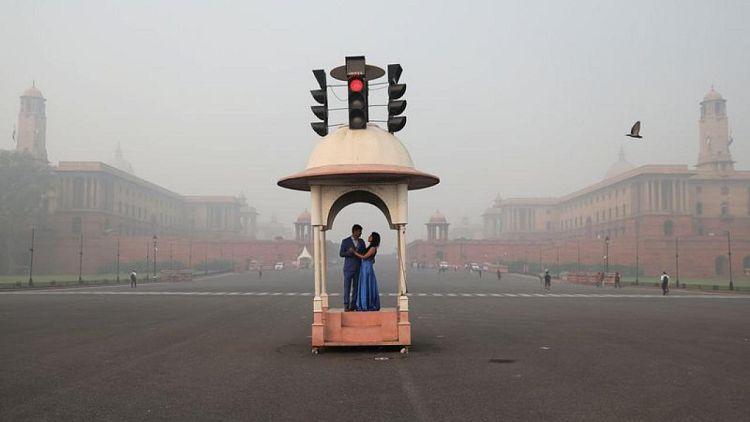By Manoj Kumar
NEW DELHI -Many students in New Delhi stayed at home on Monday rather than return to reopened schools as a toxic smog shrouded the city.
New Delhi has the worst air quality of any capital city but even by its standards the past few days have been extraordinarily bad.
Although authorities eased restrictions on schools imposed when the COVID-19 pandemic first struck India in March last year, many parents decided against sending their children back.
"The pollution in Delhi is hazardous. We as parents are afraid of sending our children to school," parent Kamlesh Sharma wrote on Twitter.
For air to be deemed safe, the Air Quality Index (AQI), which has a scale of 500, should be below 50. In New Delhi on Monday evening it was 392, well into hazardous territory. That was a marginal improvement on the 451 registered last week as moderate winds helped disperse some of the pollution.
While some schools had resumed classes for higher grades, pupils aged 14 and below were allowed back for the first time on Monday as part of a staggered re-opening.
But many schools reported attendance below 40% on the first day back due to parents fears over the hazardous air and the coronavirus risks.
"After COVID, pollution has emerged a major threat for public health particularly for children and senior citizens," Ashok Agarwal, national president, All India Parents Association, said, expressing frustration with the lack of enforcement and political will to improve Delhi's air.
Many supporters of Prime Minister Narendra Modi's ruling Bharatiya Janata Party opposed a blanket ban on fire-crackers while blaming the opposition-ruled state governments of Delhi and Punjab for worsening pollution.
Environmentalists said both federal and state governments were reluctant to take tough steps because they feared loss of support among their voters.
In a letter to the federal and state authorities, the Central Pollution Control Board Chairman Tanmay Kumar regretted that they were not "taking sufficient measures to control pollution" and asked them to curb all air polluting activities.
Exposure to pollution was causing more harm than the use of tobacco or of smoking, Randeep Guleria, director, All India Institute of Medical Sciences, told India Today TV channel.
"If you have higher levels of air pollution then the chances of having more severe COVID and dying from it goes up," he said.
Airborne particles of pollution can cause cardiovascular and respiratory diseases such as lung cancer. In India, toxic air kills more than a million people annually.
The severe deterioration in air quality during the past week was caused by farmers violating a ban on stubble burning in agricultural states surrounding the capital and people ignoring a ban on fireworks to celebrate Diwali, the Hindu festival of lights.
Nearly 80% of families in Delhi region, with a population of about 20 million, reported ailments like headaches, problems in breathing, and runny noses due to the air pollution, according a survey of 34,000 respondents by a private agency, Local Circles.
"With in-person schools finally opening after a long period of online classes, many parents seem reluctant to send children to school in the coming weeks due to the dual risk of COVID and pollution," said Sachin Taparia, head of Local Circles.
